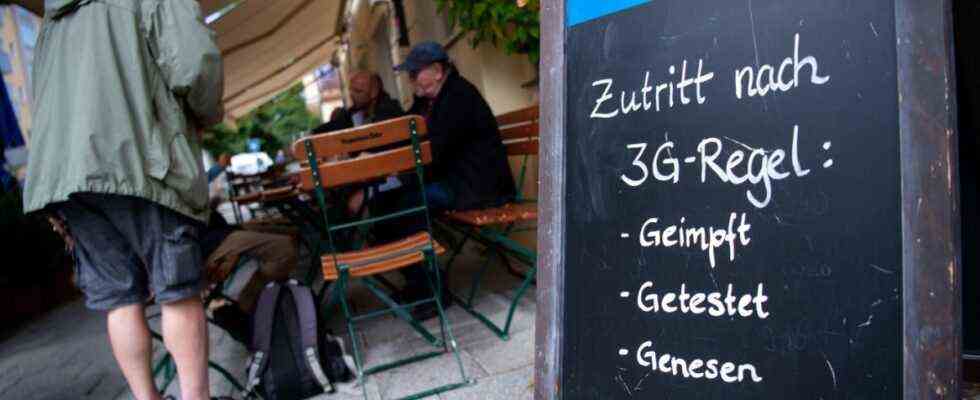At the Isartaler Brauhaus in Pullach, most customers pull out their test, vaccination or convalescence certificate by themselves. But there are always guests who have forgotten their documents in the car. Service agent Simone Ester then has to explain again that she has to see the evidence herself before she lets the customers into the restaurant. Explaining, in turn, means time that she then lacks in actually serving the guests. This is the case with many service providers in the district, for whom the 3-G rule is an additional stress factor. But most establishments are relieved that the scheme allows them to welcome customers indoors.
On September 2, a new ordinance on infection protection measures came into force in Bavaria. Although a lot has changed, the seven-day incidence continues to be the guideline for hospitality and service providers. If this is in a district over 35, only vaccinated, convalescent or tested people (3G) are allowed to stay indoors, who can prove this accordingly.
The majority shows their vaccination certificate. Only a few can still be tested or have already gone through corona disease. In the Ruen Thai massage studio in Unterhaching, around 80 percent of the customers have been vaccinated, ten percent have recovered and the remaining ten percent show a test certificate. It looks similar at Bellissima Beauty in Feldkirchen, the Isartaler Brauhaus in Pullach and the hairdressing salon Styling by Aylin in Oberschleißheim. At the hair salon only a customer came by who had to show a test.
Again and again, Sarisa Samanmit from the Ruen Thai Massage Studio meets customers who refuse to vaccinate and test and then let off steam when she points out the corona regulations. Others find it too exhausting to be tested and prefer to forego the massage relaxation right away. Belinda Hitzschke have remained regular customers at the Bellissima beauty salon. But many new customers who have not yet been vaccinated have dropped out of the managing director. “That is an incalculable risk if some of the appointments do not come on day two”.
Most customers carry their digital vaccination records around on their cell phones, but not all. “An elderly gentleman had no internet, phone or smartphone at home, he only had his paper passport,” says Aylin Tincan, managing director of the hairdressing business Styling by Aylin. When she is cutting her hair, she often comes into contact with customers. Some older people then thankfully tell about the children or neighbors who set up the digital vaccination certificate for them. Tincan assures that she checks the evidence every time, she is not so sure about other deals.
Restaurant manager Marijan Ziza from the Isartaler Brauhaus.
(Photo: Claus Schunk)
For many, asking each guest for the document is an additional effort in addition to the actual work. “The work gets stuck with us,” says Simone Ester. But the service staff also understands the 3-G regulation. Sarisa Samanmit feels the same way. After months of business closure, she is happy to be able to welcome customers to her massage studio again. For Belinda Hitzschke, the 3-G rule offers additional security against corona infection. Painting nails and lifting eyebrows – the 37-year-old can’t do that without touching her. She has already been vaccinated twice, but there is still a certain risk of infection.
Like many others, Hitzschke feels confronted with a whole series of open questions about the corona measures and is left alone. “Are you allowed to put down a magazine or pour a drink, these are all small things about which we get too little information,” criticized the beautician. She would like to have her own contact person for her branch.
Sarisa Samanmit, who runs another branch in Munich in addition to the one in Unterhaching, has a similar experience. Therefore, different regulatory agencies are responsible for the two businesses. Samanmit: “Sometimes I have the feeling that they don’t communicate with each other.”
Masseuse Sarisa Samanmi from Unterhaching.
(Photo: Claus Schunk)
The masseuse is also not really convinced of the possibility of 2-G control. She fears that if she only accepted those who have recovered and who have been vaccinated, even more customers would drop out. For the Isartaler Brauhaus, the switch to a 2-G regulation would be manageable, because most customers are vaccinated anyway, says Simone Ester. But for other companies that is a “house number”.

